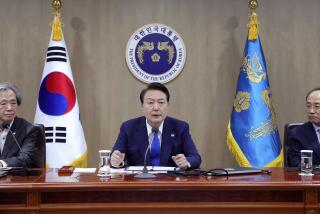N. Korea: Dozens Have Died of H1N1
Reporting from Seoul — Reclusive North Korea today took the unusual step of acknowledging that it has suffered an outbreak of swine flu, with officials saying the virus has killed dozens of citizens.
The Public Health Ministry confirmed one outbreak in the city of Sinuiju on the Chinese border and a second in the capital city of Pyongyang, according to the official Korean Central News Agency.
“The relevant [agency] is further perfecting the quarantine system against the spread of this flu virus while properly carrying on the prevention and medical treatment,” the agency said.
The report came one day after South Korean President Lee Myung-bak ordered health officials in Seoul to investigate ways to help North Korea mitigate the outbreak.
Lee instructed officials to verify reports of the North Korean outbreak and prepare swine flu medication in humanitarian aid.
The flu outbreak was first reported by a Seoul-based North Korean aid group. In its newsletter, Good Friends reported a “new type of flu” that it warned could spread across the nation.
“Considering the current trend, the possibility of the spread of the flu nationwide cannot be excluded,” the bulletin reported.
“The North Korean government seems to be working hard by taking measures such as strengthening the custom inspection . . . importing the vaccine, informing the residents about the risk factors of the flu and ordering early winter break for schools.”
Lee Seung-yong, general manager of Good Friends, estimated that 50 people have died since the flu broke out in November.
He called the acknowledgment by North Korea unusual.
“Usually, North Korea does not tell the outside world about its national disasters,” he said. The admission “is very unusual and the spreading flu is something that North Korea cannot hide.”
Chung Young-chul, a North Korea expert at Sogang University in Seoul, said North Korea had little to lose by going public.
“The H1N1 influenza is a global issue -- it’s not only North Korea’s problem,” he said, “so no political pressure exists.”
“This issue is nothing they can keep a secret about, they think,” he added. “They decided that they might [draw] international support by making it official.”
Still, North Korea for weeks had kept quiet about its mounting death toll. South Korea’s overture persuaded Pyongyang to acknowledge the flu outbreak, Lee said.
“North Korea could not cover this thing up anymore. It needs to implement a quarantine with help from the outside world,” he said.
South Korea’s Unification Ministry said Tuesday that the agency is considering offering North Korea stores of the antiviral drug Tamiflu.
“We plan to prepare specific measures in order to make the aid happen as soon as possible without condition on a humanitarian level,” said ministry spokesman Chun Hae-sung.
Since taking office in 2008, the conservative Lee has maintained a more hard-line stance on North Korea, insisting on more open communication in exchange for financial aid.
Analysts say that stance has not changed but that Lee appears to be willing to provide limited amounts of humanitarian assistance.
Park is a researcher in the Times’ Seoul bureau.
More to Read
Sign up for Essential California
The most important California stories and recommendations in your inbox every morning.
You may occasionally receive promotional content from the Los Angeles Times.










